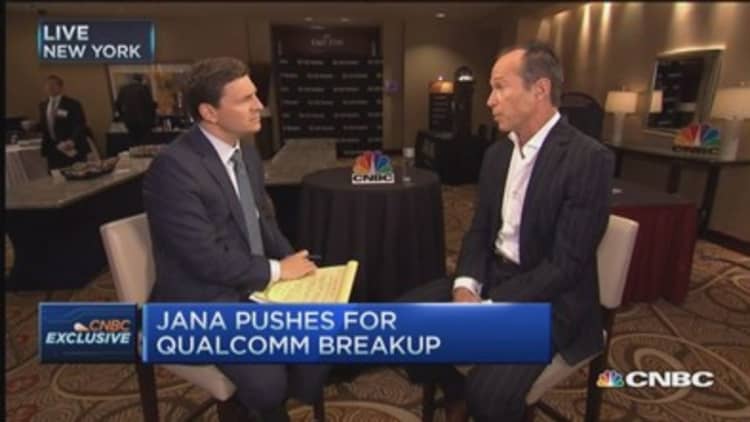
Activist investor Jana Partners has held "constructive discussions" with Qualcomm about potentially spinning off its chip unit from its patent-licensing business, Jana founder and managing partner Barry Rosenstein said on Monday.
"We are convinced that the board and the management recognize their issues. We are convinced that they're trying to do the right thing, and we're optimistic that they're going to," he said during an interview on CNBC's "Squawk on the Street."
Rosenstein emphasized that Jana is only asking Qualcomm to consider a spinoff at this point.
"What we think they ought to do is just a transparent review of the client businesses, and determine whether or not it makes sense to do either a partial or full split. So we are not definitely saying that they should split it up," he said.
Read MoreWhy rise of activist investors is bad for bonds
The Wall Street Journal reported earlier that Jana had addressed the possible split as a means of boosting the chipmaker's sagging stock price, citing a quarterly letter that will be sent to Jana investors on Monday.
Shares of Qualcomm, which has a market capitalization of $115.4 billion, have fallen about 6 percent since the beginning of this year. The stock was trading nearly 1 percent higher on Monday.
Jana, one of Qualcomm's largest shareholders, is also calling on the company to cut costs, accelerate stock buybacks and make changes to its executive pay structure, financial reporting and board of directors, the newspaper said.
Qualcomm said last month it would buy back up to $15 billion of shares and raise its quarterly dividend. The company also said it would continue to return at least 75 percent of its free cash flow to shareholders annually.
Rosenstein acknowledged that Qualcomm has already announced a $10 billion advanced share repurchase, but said he believed the company could return an additional $5 billion within four to six months.
In the letter, Jana said the buyback is a positive step but Qualcomm needs to do more to capitalize on its strong position in the chip market. Rosenstein told CNBC Qualcomm's chip business is essentially worthless at the company's present market value.
"Obviously, it's not worth negative value, it generates $3 billion of EBIT annually and has tremendous strategic value," Rosenstein said. "So we think they need to look at it, they need to figure out what they can do to close the value gap."
Read MoreThe young & the restless: Activism's rising stars
While the majority of Qualcomm's revenue comes from selling so-called baseband chips that enable phones to communicate with carrier networks, most of its profit comes from licensing patents for its widespread CDMA cellphone technology.
Qualcomm's longtime customer Samsung Electronics opted this year to use an internally developed processor for its new Galaxy S6 smartphone rather than Qualcomm's latest Snapdragon mobile chip.
Reuters contributed to this story.



